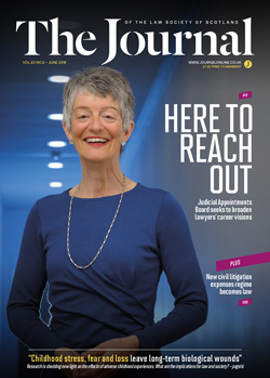Meet Laura

Since turning 16 I have been living independently from my family. Estrangement comes with its many challenges (I spent a period of time living in a homeless shelter while keeping up my studies at school), but it has the power to help you grow into yourself. Refusing to let this have a negative impact, I stuck in at school and got the grades I needed. I wanted to help people. I wanted to show my appreciation for all the people who assisted me through this time. Therefore, I chose to study law. I applied to the Lawscot Foundation as this was an amazing opportunity. Thankfully I was successful in my application.
First year on the LLB has been a rollercoaster. I have met amazing people through my course, sport and through the Foundation. The work has been challenging, as university work is such a big jump from High School. However, I have enjoyed diving into the tasks and giving my full effort to obtain the best grades I possibly can. The course has given me so much more confidence in myself, as I believe I can be successful and that I have the ability to produce work that meets expectations.
Having two mentors has helped immensely. Monthly meetings with Rachael have given me the opportunity to talk about short and long-term goals, as well as discussing any issues I am having. Rachael provides amazing guidance for going forward and has provided me with contacts and networking opportunities. As well as having a mentor who is working in the profession, I have also been given a student mentor who attends the same university and is ahead of me on the course. The mentors have played a large part in making me feel a lot more relaxed about the course when I have felt concerned or stressed, and they have played an important part in building my confidence.
The bursary that is provided by the Lawscot Foundation is an added benefit as it takes off a lot of financial stress. The bursary has helped me to obtain the recommended books for modules to aid my studies as well as allowing me to live comfortably. Before coming to university money was a big issue for me. I was terrified I would not be able to afford it as I do not have parental help, but the Foundation allowing me to have this opportunity has lifted a massive weight off of my shoulders and I am forever thankful.
The mentor’s view
My experience in mentoring Laura could not have been better. Going into our first meeting, I felt prepared by my training and had developed confidence in being able to discuss and set goals with my mentee. Throughout the year it was very satisfying to see my mentee doing so well. We meet once a month, but also have email and text in between. Laura knows that I am able to provide practical support on things such as how to prepare for exams, lending her old books and setting up some relevant work experience for her. Our monthly meetings, although structured, are also very social, and it is good to have a friendly relationship where Laura can ask me any questions, legal and non-legal.
Over the course of the academic year, we have built a strong relationship and I am keen to help Laura in any way I can as she has done a fantastic job and come so far. I hope to be able to help her continue to excel and progress. I have found this commitment both easy and enjoyable to balance with my working commitments, and have been given internal encouragement and support too from all of the supervising partners.
Rachel Delaney’s profile can be read here.
Support the Foundation
Despite there being no fees, in relation to students from disadvantaged backgrounds going to university Scotland is the worst performing jurisdiction in the UK. It’s not all about finance, but finance remains a huge barrier. A typical student receiving the maximum loan and bursary available, staying in an average priced hall of residence, would be left with around £3 a day to cover food, books, travel, and accommodation during holidays.
To survive financially, many students must balance part-time jobs with their studies, and can end up working essentially full-time hours to keep themselves afloat, with relevant work experience and academic studies becoming less of a priority.
If every solicitor in Scotland donated just £10, Lawscot Foundation could support around 40 students through their degree and Diploma. It’s easy to donate – simply text LSFD10 £10 to 70070, or visit www.lawscotfoundation.org.uk. The Foundation has signed up to AmazonSmile and Easyfundraising, so every time you shop online you could support the future of the profession without it costing you any extra – search for Law Society of Scotland Education Foundation.
In this issue
- Recovery of electronic documents: time for guidance?
- Reasonable treatment options and professional judgment
- Retention demystified?
- Child law: time for change? (1)
- Reading for pleasure
- Opinion: Ayla Iridag
- Book reviews
- Profile: Rachael Delaney
- President's column
- Keeper's update
- People on the move
- Choice answers
- When four ACEs is a bad hand
- Litigation: passing the bill
- Child law: time for change?
- Debt recovery and AI: are we plugged in?
- Technical but important
- Ringing the changes: UK and EU IP developments
- Commercially sensitive? Justify that
- Abandonment: whose use counts?
- Retroactive TUEs and the Nasri case
- Clarifying real burden enforcement rights
- How we deal with leases at termination
- In-house and in the know
- Public policy highlights
- Meet Laura
- Complaints: from "bonkers" to benefit?
- That time of year again
- AGM does ABS – a reprise
- Paralegal pointers
- Finance for dummies (and lawyers)
- Ask Ash






